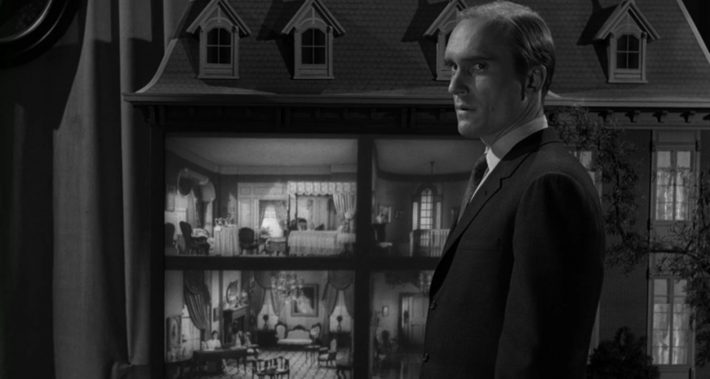Charlie is a man who simply doesn’t belong anywhere. He sucks at his job, he has trouble interacting with people, and he’s just not normal. But he isn’t a bad person, not by a long shot. He visits a museum and becomes entranced with this dollhouse with miniatures in it. He walks away at first, until he notices one of the miniatures, clearly a human woman, playing a harpsichord. He marvels over how realistic the mechanical miniatures are to the museum guard, who looks at him like he has bugs crawling from his eyes. The guard sees nothing and says that the doll was carved from wood.
Charlie is fired from his job for being too weird. But out of kindness on the way out, his former boss tells him he thinks it’s time to stop living with his mother. And you soon see why. Charlie’s mom is overbearing and needy and wants to call that boss to give him the what for. But all she wants is for him to be normal: to have a wife and children and live a normal life. And this is where I came to see this as an allegory for living life as a closeted gay man. That’s all everyone wants for Charlie. To be normal like his sister, who is happily married. To not make people “uncomfortable”. To stop being so damn weird. Sound familiar?
They even laugh at the idea of him having a girlfriend when his brother-in-law suggests that could be causing his distant behavior. His family wants him to take a new job at his brother-in-law’s employer, one that, if he had taken, likely would have failed at too. And when his sister sits him down at lunch, she keeps mentioning that he’s sick, and he knows he’s sick, and he needs to just meet a girl because he’s over 30 and not married. The horror. She sets him up on a date that goes predictably terrible. His date kisses him and he reacts with total aversion and disgust, and she runs away saying he needs a doctor.
Charlie keeps going back to the museum to see the display, to confirm what he saw and because he finds comfort in it. His constant obsession with the dollhouse raises the eyebrow of the security guard, especially when he begins talking to the young woman in the display. He sees all sorts of scenarios play out, and recognizes that the miniature in the box is involved in an abusive relationship with a creepy suitor. He tries desperately to remove the top of the dollhouse to save the miniature after she’s been knocked out and whisked upstairs,and then breaks glass to get her out. This, of course, gets him sent to a psych facility.
Charlie decides to fake being cured of what his doctors call hallucinations, but he wants so desperately to get back to the dollhouse. He doesn’t give a damn about the life his family is planning for him, taking the new job and going out with the girl he scared away. So he locks his door, escapes through the bedroom window, and makes it back to the museum. When his family comes looking for him, however, they cannot find him. For Charlie has fallen in love with the miniature in the dollhouse, and he is transported into the case. The security guard sees him and says nothing.
The ending clinches the “life as a gay man” allegory to me. He tells the miniature how he’s desperately alone, and has been for all his life. They just can’t understand him, but she could. They could help each other and they wouldn’t be lonely anymore.
It’s such a beautiful, sad and striking story, and Robert Duvall plays Charlie with such nuance. A character like this could easily be creepy with a different actor, but Charlie isn’t. Charlie is just a sad, lonely man in a world that is not meant for him, so he goes to a new world and finds happiness there. And people remember Duvall for performances like Boo Radley and Tom Hagen, but I don’t believe he was ever any better than he was during this episode. Just watching him on screen, you cannot help but feel empathy for Charlie and hope he gets what he wants in the end, even if it sounds a bit mad. And while his family are not bad people, they’re trying to fix a man whose only brokenness is how lonely he is, and throwing a floozy from his sister’s office at him is not going to get rid of that loneliness. Charlie found his happiness, and he is left with the one thing the world was not willing to give him: love and companionship.
Small note: This episode was credited to Charles Beaumont, but in 1963, he started falling gravely ill and had a series of friends and freelance writers ghostwrite for him so he wouldn’t miss his deadlines. So it’s possible Charles Beaumont did not write this script. He ended up passing away at the age of 38 from early onset Alzheimer’s and Pick’s disease, looking about forty years older than he actually was.
You can watch this episode on Hulu or on Blu-Ray/DVD. For some reason, season four isn’t on Amazon Prime or Netflix.
Next week I will be covering The Shelter.
